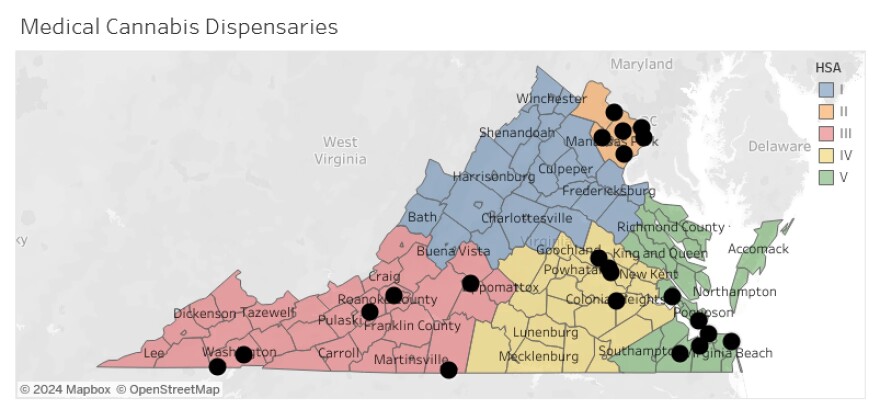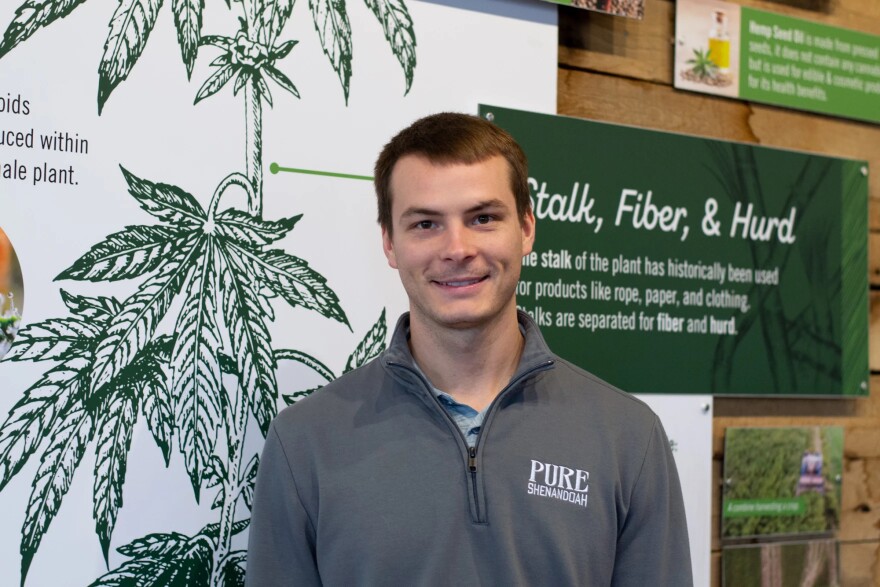Read the original story on WMRA website.
Last year, the General Assembly transferred oversight of the state’s medical marijuana program to the Virginia Cannabis Control Authority from the Board of Pharmacy. The shift went into effect on Jan. 1.
Jeremy Preiss, acting head of the authority, said one of its top priorities is getting a medical marijuana provider established in Health Service Area I — which spans Winchester to Fredericksburg, south through Charlottesville and into the Shenandoah Valley.
“Because right now, patients in Health Service Area I have to travel elsewhere to access regulated product,” Preiss said.
Patients in this region who’ve been approved by a licensed practitioner to use cannabis for a medical condition have to travel as far as Washington, D.C., or Richmond if they want to visit a dispensary. This is the only health service area out of five across the state that does not have a medical marijuana provider, officially referred to as a “pharmaceutical processor.”

That’s because the company that won the original contract, PharmaCann, had its license rescinded by the Board of Pharmacy in 2020. According to court documents and the Cannabis Business Times, the company had purchased land in Staunton where it planned to set up shop.
State law requires pharmaceutical processors to have a vertically integrated headquarters, where they grow, process and sell medical marijuana all from one location. Then they can set up additional retail outposts — or dispensaries.
PharmaCann delayed construction of its Staunton headquarters because of a gas line running through the property and asked for an extension to complete permitting requirements. But by June 2020, the board decided PharmaCann had taken too long and rescinded its license. PharmaCann sued.
While the litigation played out, “the courts had stayed the Board of Pharmacy’s ability to identify another entity to run a medical cannabis business,” Preiss said.
That litigation ended last year, when PharmaCann lost its appeal. Preiss said the CCA hopes to have a replacement chosen in the first half 2024.
One homegrown enterprise is poised to throw its hat in the ring.
Tanner Johnson is CEO of Pure Shenandoah, a family-run hemp and CBD company based in a historic industrial building in Elkton, just east of Harrisonburg. Pure Shenandoah tried applying for the pharmaceutical processor license back in 2020, before it got tied up in court — and the company is eager for another shot.

“We’ve already lined up multiple facilities that we could retrofit. We’ve got multiple pieces of land that we can build on. We’re narrowing in exactly where we want to be. But for the most part, our home base is going to be in Harrisonburg,” Johnson said.
If its application wins, Pure Shenandoah would become the first local, Virginia-based company authorized to sell medical marijuana in the state.
Johnson envisions setting up dispensaries in Staunton, Winchester, Charlottesville and Fredericksburg. He and his team have been talking to politicians while the local medical program and entire recreational market have been delayed. One of the misconceptions he hopes to break down is the idea that there’s a big difference between medical and recreational products.
In his illustration, Johnson used the term “pre-roll” — commonly referred to as a joint.
“Imagine you have a pre-roll in your hand. You just bought it from a licensed dispensary. You’re in your house and everything’s legal. You've been on your feet all day. Your knees are hurting. Your back hurts. You’re anxious about the next day because you know it’s going to be a big day,” Johnson said. “You turn to that cannabis and you smoke a little bit. You feel better, the pain goes away, the anxiety might go away. You say, ‘Hey, I can get through this.’ People would say that’s a medicinal use of cannabis, and I would agree with that, too. Now, that same pre-roll, that same person heading out to a concert, smokes that pre-roll so it can be a little bit more fun. Now, that’s a recreational use, pretty much by definition. What changed?”
Where does this legislative ambiguity about recreational cannabis leave the CCA? Preiss said, for now, it has plenty on its plate with taking over the medical side.
“We’re certainly capable of standing up an adult-use retail market, but of course, that’s a decision for elected officials, both in the General Assembly and the administration,” Preiss said. “I can tell you that there is still great interest in the legislature for enacting a law that would create an adult-use retail market. Time will tell whether there can be a proposal that generates sufficient support to become law.”


